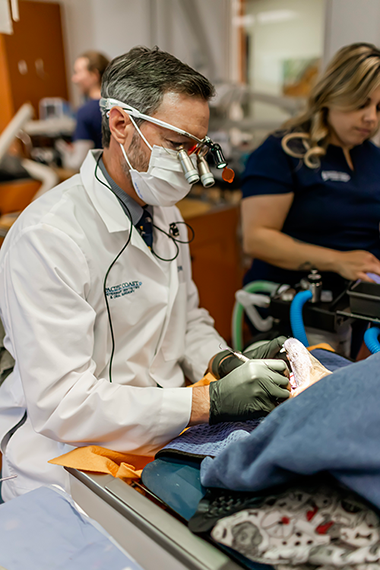Frequently Asked Questions
A pick up appointment is set up at the time of your pets admission. This time may be subject to change based on the procedure and recovery of your pet, a technician or receptionist will call you once your pet is awake to confirm the pick up appointment time.
At the pick up appointment, you will meet with the Doctor. The treatments will be explained and copies of all pictures, x-rays and other records will be send home with you. These records will also be forwarded to your referring veterinarian. We do not have overnight monitoring at our clinic. If your pet requires additional monitoring or treatment overnight, we will refer you to your closest 24 hour emergency facility, or your referring veterinarian if appropriate overnight care is provided.
You will have an after-hours contact phone number for any urgent questions or concerns after surgery. We do not have overnight care at our clinic. If an emergency arises after-hours or on weekends, please go immediately to you referring veterinarian if open or your closest 24 hour emergency care center.
A 25% deposit is expected at admission for treatment based on the high estimate of services needed. The remainder of the balance is expected at the time of discharge. We accept all major credit cards, cash, personal checks and Care Credit. Apply for Care Credit HERE. (www.carecredit.com)
It only takes 12-24 hours for plaque to start accumulating on the teeth after a professional cleaning. Without intervention, in the form of brushing, it only takes 2 weeks for tartar to start forming. Overtime the tartar accumulation allows anaerobic (no oxygen) bacteria to flourish below the gum line. These bacteria produce a multitude of toxins which irritate the gums and the bone causing periodontal disease; one of these toxins is sulfur, one of causes of the smell.
For your first appointment, we ask that you arrive 10-15 minutes early to allow time to fill out the new client form. To save time you can print the form HERE and fax/email to us or bring it with you. We require pre-anesthetic blood work on all of our patients, young and old. Please bring, or have your regular veterinarian fax or email, a copy of the most recent blood work. We are able to perform routine blood work in our office on the day of the procedure.
A full conscious (awake) oral examination is performed to the best of our ability, or to what your pet will allow, to assess the oral health. The findings will be explained and discussed with you. The best treatment and any options for treatment will be discussed Based on the findings, we will provide an itemized estimate for the cost of the services and any options. If you agree to the terms, we will admit your pet to the hospital for treatment. If you need more time before treatment is pursued, the only charge is for the professional examination and surgery can be scheduled at your convenience.
Under general anesthesia, a full oral examination is performed, the teeth are professionally cleaned (if needed) and full mouth dental radiographs are taken. Based on those findings, we will perform the necessary treatments discussed during the examination. If the findings differ from the original discussion, we will always call you to explain. For this reason, we need a contact phone number where you can be reached at all times during your pets stay at our office.
General anesthesia not only allows a thorough oral examination, it also allows us to effectively clean all surfaces of the teeth, above and below the gum line. It relieves anxiety to the animals who don’t understand what is being done to their mouths.
Full mouth dental X-rays are performed on every new anesthetized patient as part of a complete oral exam. The importance of dental X-rays are often overlooked and periodontal therapy should not be considered complete without them. The X-rays allow us to evaluate the health of the tooth and bone below the gum line. Unfortunately, the X-rays cannot be taken in an awake animal as even the slightest amount of motion can blur the image and lead to mis-diagnosis. The digital sensors are also very expensive and easily susceptible to damage if the awake animal bites down.
Any treatment beyond a superficial cleaning of the teeth crowns requires general anesthesia. This will reduce your pets anxiety and also prevent pain and discomfort experienced by your pet, even during routine scaling below the gum line.


